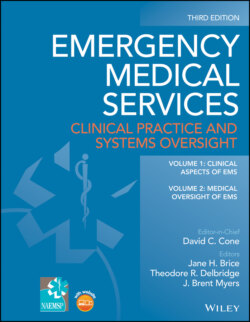Читать книгу Emergency Medical Services - Группа авторов - Страница 389
Febrile seizures
ОглавлениеFebrile seizures are one of the most common seizure types encountered in emergency practice, in both the field and the ED. Definitions in the literature vary, but a seizure associated with fever in children aged 6 months to 5 years without evidence of intracranial infection or other definite cause of seizure is an accepted definition. The age‐delineated definition acknowledges the sensitivity of the maturing brain to fever [26]. Excluded are fever‐associated seizures in patients who have experienced afebrile seizures in the past. Peak incidence is at 18 months. Other events that may simulate seizures in this age group include rigors, breath‐holding spells, apneic episodes, and anoxic seizures. History is key in sorting out these events.
Many febrile seizures occur early in the course of the underlying illness and may be the presenting symptom of the illness. The magnitude and peak of the fever are likely to be more important in provoking seizures than the rate of increase. Antipyretics have not been shown to be effective in reducing the risk of febrile seizures [26].
Febrile seizures are often divided into simple and complex types. A simple febrile seizure is a generalized tonic‐clonic convulsion without focal signs lasting less than 10 minutes, resolving spontaneously, and not recurring within 24 hours. Complex febrile seizures fall outside this definition due to focal signs during the seizures, seizure duration, or recurrence.
By definition, a simple febrile seizure will likely have ceased by arrival of EMS, unless the response interval is very short. Recurrent or prolonged seizures exclude this diagnosis and point to a complex febrile seizure or another cause for the seizure. EMS clinicians should elicit important historical details, including preceding irritability, decreased feeding, or abnormal consciousness that might suggest an underlying CNS infection. Most children experiencing febrile seizures recover within 30 minutes. Postictal alteration of consciousness persisting more than 60 minutes has been suggested as a risk factor for a complicating medical condition [27].
